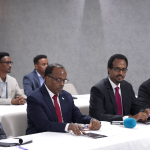The Government of Somalia, under the leadership of President Hassan Sheikh has been resolute in its commitment to prioritize the war against Al-Shabaab since coming to power last year. Adopting a multi-pronged approach that encompasses psychological, financial, and military strategies, the government has dealt a significant blow to the control and influence of Al-Shabaab in the region. As a result, Al-Shabaab has been on the defensive, suffering defeat after defeat, and struggling to maintain its grip on the hearts and minds of the Somali population.
One of the key factors contributing to the decline in Al-Shabaab’s strength has been an increase in the number of defectors who have escaped from the group’s ranks. These defectors have shared harrowing tales of horror, exposing the brutal and oppressive nature of Al-Shabaab’s ideology and tactics. Their testimonies have served as a powerful deterrent for potential recruits, dissuading them from joining the terrorist group and undermining Al-
Shabaab’s ability to replenish its ranks.
Another factor that has weakened Al-Shabaab is the government’s concerted efforts to tighten the noose on the group’s sources of revenue. Al-Shabaab has long relied on illicit activities such as extortion, kidnapping for ransom, and smuggling to fund its operations. However, the government has been successful in disrupting these financial streams, choking off the flow of funds to the terrorist group. This has severely limited Al-Shabaab’s ability to sustain its operations and pay its fighters, further eroding its morale and cohesion.
Al-Shabaab has also faced internal strife due to its desperate attempts to fight the government and local fighters who have turned against them. In some cases, there have been reports of armed confrontations among the group’s leadership, reflecting growing dissent and discord within their ranks. The pressure from government operations on their hideouts has increased, resulting in a mounting number of Al-Shabaab fighters being killed on the battlefront. This has further weakened the group’s operational capabilities and demoralized its leadership.
Additionally, the Somali public has become increasingly vigilant and aware of the evil tactics employed by Al-Shabaab. Through government-led awareness campaigns and community engagement initiatives, the population has been educated about the dangers and atrocities committed by the terrorist group. This has fostered a sense of resilience and resistance among the Somali people, who have become more inclined to reject the extremist ideology propagated by Al-Shabaab.
Furthermore, the shrinking of territories under Al-Shabaab’s control has significantly impacted the group’s operations. The government, supported by regional and international partners, has made significant strides in reclaiming territory from the terrorist group, pushing them into remote areas and limiting their ability to carry out attacks. This loss of territory has not only diminished Al-Shabaab’s operational capacity but has also eroded its perception of invincibility among its followers, causing fractures within the group’s leadership and sapping its morale.
As a result of these combined efforts, the leaders of Al-Shabaab have gone into hiding and have avoided public appearances, demonstrating their increased fear and vulnerability. They have also minimized their media statements, indicating their diminished confidence and influence. The sustained pressure from the government and its partners has left Al-Shabaab weakened and on the defensive, struggling to maintain its grip on power and support.
The Government of Somalia, under President Hassan Sheikh’s leadership, has adopted a multi-pronged approach to combat Al-Shabaab, targeting the group on psychological, financial, and military fronts. The successes of these efforts are evident in the declining number of new recruits, increased defections, reduced income, internal strife within the group, stepped-up government operations, vigilant public, and shrinking territories under Al-Shabaab’s control. While the threat posed by Al-Shabaab is not completely eradicated, the significant setbacks the group has faced are a testament to the government’s determination and progress in countering terrorism in Somalia.
The government’s psychological approach, which includes efforts to expose the true nature of Al-Shabaab’s ideology through defector testimonies and awareness campaigns, has been effective in dissuading potential recruits from joining the group. The gruesome realities of life under Al-Shabaab’s rule, including violence, oppression, and extremism, have been exposed, undermining the group’s appeal and recruitment efforts.
The government’s financial approach, aimed at disrupting Al-Shabaab’s funding sources, has severely impacted the group’s ability to sustain its operations. By cracking down on illicit activities such as extortion, kidnapping for ransom, and smuggling, the government has deprived Al-Shabaab of the funds it needs to carry out attacks and pay its fighters. This has forced the group to resort to desperate measures and has weakened its overall capabilities.
The government’s military approach, characterized by intensified operations against Al-Shabaab hideouts and strong coordination with regional and
international partners, has been instrumental in pushing the group into remote areas and reclaiming territories. The increased pressure on the group has resulted in a significant number of Al-Shabaab fighters being killed or captured, further diminishing their ranks and capabilities.
Additionally, the vigilance of the Somali public and their increased awareness of Al-Shabaab’s tactics has led to a more resilient and resistant population. Communities have become active partners in countering terrorism, providing information to security forces and rejecting the extremist ideology promoted by Al-Shabaab. This has created a hostile environment for the group, where their recruitment efforts are met with skepticism and resistance.
Furthermore, the shrinking of territories under Al-Shabaab’s control has dealt a severe blow to the group’s image of invincibility. As the government reclaims territory, it undermines Al-Shabaab’s narrative of being a powerful force capable of establishing an Islamic state in Somalia. This has caused fractures within the group’s leadership and has dampened its morale, leading to internal conflicts and disagreements.
As a result of these combined efforts, the leaders of Al-Shabaab have gone into hiding, avoiding public appearances and minimizing media statements. The group is increasingly struggling to maintain its operations and influence, as its fighters face defeat on the battlefront and its leaders face internal tensions. The decline in the number of new recruits, the loss of funding sources, and the shrinking of territories have weakened the group’s capabilities and have put it on the defensive.
However, it is important to note that the threat posed by Al-Shabaab is not completely eliminated, and the government of Somalia continues to face challenges in countering terrorism. The group may resort to desperate measures, including increased asymmetric attacks and recruitment tactics, as it seeks to regain lost ground. Therefore, sustained efforts by the government, in collaboration with regional and international partners, are crucial to consolidate the gains made and ensure the long-term defeat of Al-Shabaab in Somalia.
In conclusion, the government of Somalia, led by President Hassan Sheikh, has prioritized the war against Al-Shabaab and has adopted a multi-pronged approach to counter the group. Through psychological, financial, and military strategies, the government has dealt significant blows to Al-Shabaab’s control and influence. The decline in recruits, reduced income, internal strife, government operations, vigilant public, and shrinking territories have weakened Al-Shabaab’s capabilities and have put the group on the defensive. While challenges persist, the government’s efforts have resulted in significant setbacks for Al-Shabaab, underscoring the importance of continued efforts to combat terrorism in Somalia.
By Abdiqani Abdullahi





